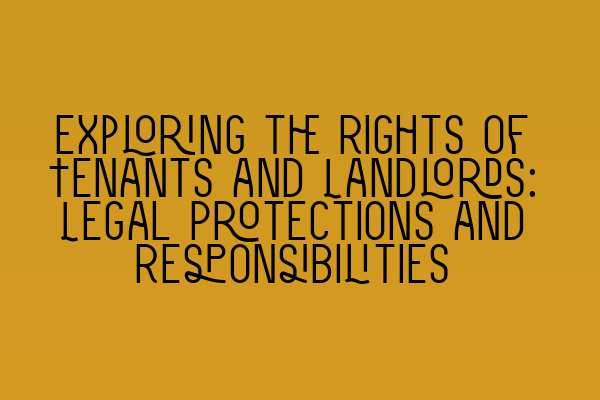Exploring the Rights of Tenants and Landlords: Legal Protections and Responsibilities
When it comes to the relationship between tenants and landlords, it is crucial to understand the rights and responsibilities that both parties have. Whether you are a tenant looking for a place to rent or a landlord seeking to lease your property, having a solid understanding of the legal protections and duties involved can help ensure a smooth and fair agreement. In this article, we will delve into the various aspects of tenant and landlord rights and explore the legal framework that governs these relationships.
Tenant Rights
Tenants have specific rights that are designed to protect their interests and ensure they are treated fairly throughout the tenancy. One of the most fundamental rights for tenants is the right to occupy a property that is safe and habitable. This means that landlords have an obligation to maintain the property in good repair and address any health or safety issues promptly.
Additionally, tenants have the right to privacy. Landlords cannot enter the rented property without proper notice, except in certain emergency situations. By respecting the tenant’s right to privacy, landlords can help create a trustworthy and respectful relationship.
Another important tenant right is protection against unfair eviction. Landlords must follow the legal procedures for eviction and cannot force a tenant to leave without a valid reason. Tenants have the right to receive proper notice and, in some cases, the opportunity to rectify any issues that may have led to the eviction notice.
To ensure their rights are protected, tenants should thoroughly review the tenancy agreement before signing. Understanding the terms and conditions of the agreement can help prevent disputes and ensure a mutually beneficial relationship between tenants and landlords.
Landlord Rights
While tenants have a set of rights, landlords also have their own rights and responsibilities. As the owner of the property, landlords have the right to receive rent payments in full and on time. They can also expect tenants to take care of the property and refrain from causing any damage beyond normal wear and tear.
Additionally, landlords have the right to conduct periodic inspections to ensure the property is being properly maintained and that there are no lease violations. However, it is important for landlords to provide proper notice to tenants before carrying out inspections.
Landlords also have the right to protect their property by taking legal action against tenants who breach the terms of the tenancy agreement. If a tenant fails to pay rent, causes significant damage to the property, or engages in illegal activities on the premises, landlords can pursue eviction proceedings and seek compensation for any losses incurred.
Legal Protections and Responsibilities
The rights and responsibilities of tenants and landlords are not solely determined by verbal agreements or individual preferences. There are legal frameworks in place to protect both parties and ensure fair treatment.
One such legal protection is the requirement for a written tenancy agreement. This document outlines the terms and conditions of the tenancy, including rent amount, payment schedule, duration, and any additional rules or responsibilities agreed upon by both parties. Having a written agreement can help avoid misunderstandings and provide a solid foundation for the tenancy.
In general, landlords are responsible for maintaining the property, making essential repairs, and ensuring the property meets health and safety standards. Tenants, on the other hand, are responsible for paying rent, keeping the property clean, and reporting any maintenance issues in a timely manner.
It is also worth noting that discrimination is strictly prohibited within the landlord-tenant relationship. Landlords cannot refuse to rent to someone based on their race, gender, religion, disability, or any other protected characteristic. Similarly, tenants must not discriminate against landlords based on these factors.
Conclusion
In conclusion, understanding the rights and responsibilities of tenants and landlords is essential for maintaining a fair and respectful relationship. By knowing their legal protections, tenants can ensure they are treated fairly, live in a safe environment, and avoid unfair eviction. Landlords, on the other hand, can protect their property, receive rent payments on time, and take appropriate action against tenants who breach the tenancy agreement.
For more information on preparing for the SQE exams and other legal topics, feel free to check out our related articles:
- SQE 1 Practice Exam Questions
- SQE 1 Practice Mocks FLK1 FLK2
- SQE 2 Preparation Courses
- SQE 1 Preparation Courses
- SRA SQE Exam Dates
At SQE Property Law & Land Law, we have a team of experienced professionals ready to assist you with any property law matters. Contact us today to learn more about your rights and get the legal support you need.
